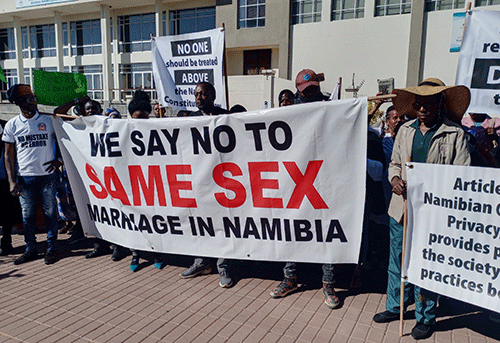The Coalition of Christian Churches has demanded the home affairs ministry drafts legislation to outlaw same-sex marriages in Namibia.
The request comes amidst a heated national debate on same-sex marriages in the wake of the recent Supreme Court’s ruling that instructed the home affairs ministry to recognise all civil marriages, including of the same sex, solemnised in jurisdictions outside the country.
On Friday, the Coalition and anti-LGBTQ+ supporters held a demonstration against the controversial Supreme Court ruling. The demonstrations took place in Windhoek, Rundu, Nkurenkuru, Katima Mulilo, Omuthiya and Keetmanshoop.
In Windhoek, the petition, which was signed by 26 000 people, was handed over at the home affairs ministry and National Assembly.
Speaking on behalf of the religious coalition, Shirley Magazi said, as churches in Namibia, they will uphold and preserve morality in the country.
“We will not sit back and allow our children to be recruited into this community. We will stand and protect our children. We will stand to protect the family unit that the State and society have an obligation to protect. We will ensure that our children are raised in a natural environment,” said Magazi.
She said it is the home affairs ministry’s responsibility to ensure marriages are recognised by the values of the Namibian people and that the customary laws of the country are upheld.
“We are pleading with your honourable minister that as the National Assembly resumes next week, we are expecting and demanding that the Ministry of Home Affairs will initiate a bill and inform the National Assembly that the public came demanding an enactment of a law that explicitly says same-sex partnerships cannot be recognised in Namibia,” said Magazi.
The coalition has, thus, asked lawmakers to amend the Immigration Control Act 7 of 1993 to define a spouse as “a husband who is a man or male and a wife as woman or female”. They also want the law to explicitly state that marriage is explicitly between a man and a woman.
“The law should prohibit same-sex partnerships and marriages and any funding that promotes such practices. Such a law would put to rest the matter and articulate the values and morals of the Namibian people,” said Magazi.
She said all these demands must also be incorporated into the Marriage Bill, which is currently being amended. Magazi further said a handful of judges cannot be allowed to change the law in one sitting.
The ruling, which marked a significant step towards LGBTQ+ rights in the country, has revealed deep divisions within society regarding the recognition of same-sex unions.
Earlier this year, the matter was brought to the fore during residency applications of a German woman, who married a Namibian woman in Germany, and a South African man who married a Namibian man in South Africa. The latter is the only country on the continent that allows same-sex marriage.
In the Namibian Supreme Court judgement, four judges declared the denial of official recognition by the ministry of home affairs to same-sex marriages conducted outside Namibia violates the constitutional rights to equality and dignity. The court declared that the marriages of the two couples should be acknowledged in Namibia.
As a result of this judgement, non-Namibian spouses in same-sex marriages are granted the same rights of residence in Namibia that are typically granted to spouses in heterosexual marriages.
Last month, Ugandan President Yoweri Museveni signed into law a controversial anti-gay bill, introducing draconian measures against homosexuality, which have been described as among the world’s harshest.
According to the bill, the Anti-Homosexuality Act 2023, any person identifying as gay would not be criminalised but “engaging in acts of homosexuality” would be an offence punishable with life imprisonment.
The bill also states that anyone who “knowingly promotes homosexuality” faces up to 20 years in jail – a provision left unchanged from the original bill.
Organisations found guilty of encouraging same-sex activity can face a 10-year ban.
Homosexuality was criminalised in Uganda under colonial laws, but there has never been a conviction for consensual same-sex activity since independence from Britain in 1962.
– Additional reporting from Nampa/AFP
– mamakali@nepc.com.na



